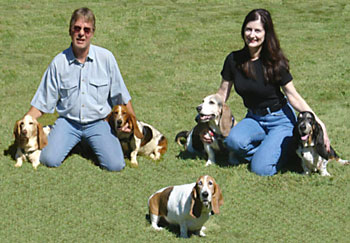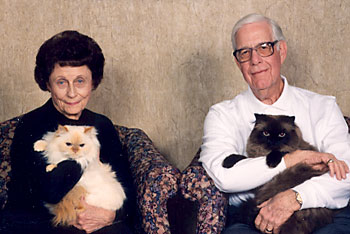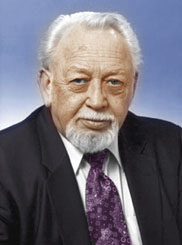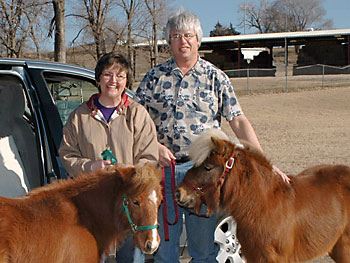
Brad and Jeanita McNulty, Blue Grass, Iowa, with their basset hounds: Belle (in front) and (left to right) Harley, Effie, Watson and Sophie.
Brad McNulty surfed the Internet on a quest. As a certified public accountant, Brad had estate-planning experience and he knew his personal situation was unusual. He had only a vague idea of what to look for when he found a Web site that looked promising. He scrolled down the page and saw an intriguing link to the Perpetual Pet Care Program (PPCP) at the K-State College of Veterinary Medicine.
A recent job transfer had taken Brad and his wife, Jeanita, away from relatives in their home state of South Dakota. Living in Blue Grass, Iowa, they became concerned that if anything ever happened to them, no one would be there to take care of their "family" — six basset hounds named Kelsey, Festus, Sadie, Harley, Watson and Sophie. (Since pets are usually considered to be property, the PPCP helped solve problems of planning for their dogs' care, while it would also fund scholarships and research in the College of Veterinary Medicine.) Because Brad and Jeanita didn't have any connection to K-State, they wanted to learn more about the program in person.
"We had a trip planned to Kansas City anyway," said Jeanita, who is a part-time librarian. "We decided at that time we would drive to Manhattan to see what we thought of the facilities and the people."
The McNultys, pet owners for more than 20 years, had visited other veterinary college facilities at both Colorado State and Iowa State universities. They had very strong ideas about choosing the right place for their basset hounds.
"We wanted to get a feeling for how the facility would take care of our animals," Brad said. "The people at KSU all seem to have that same level of caring and concern for the program that we do for our bassets. We found what we believed to be a perfect match."
"We were very impressed," Jeanita said.
Brad and Jeanita's first dogs were a collie mix named Cody and a cockapoo named Blackie. Later Jeanita decided she wanted to have a basset hound, so they picked out a puppy, which they named Lady Baxter III, or Baxter for short.
"Don't ask why I wanted a basset hound," Jeanita said. "It's kind of a mystery, even to me."
Over the years they acquired other basset hounds and even rescued one they found abandoned at the side of a highway. The dog was in poor shape and had been left to die. Naming him Festus, after the Gunsmoke character, they took him home and helped nurse him back to health. Despite their efforts, something still wasn't quite right. It turned out that Festus was blind. Although Festus requires extra attention, he fits right in with their other basset hounds.
The McNultys made sure their Iowa home would properly accommodate their dogs. They built the house with a heated garage/kennel and a doggy door that leads to a spacious 10,000-square-foot fenced backyard.
"They like to chase each other and keep each other company," Brad said.
"When Brad leaves in the morning, Watson will get the others howling, like a chorus," Jeanita said. "They do their little song until I come out. They must think they’re home alone because when I let them know I'm there, they quiet down."
Soon after their visit to Manhattan, the McNultys decided to make a commitment of $500,000 to enroll their basset hounds in the PPCP.
"The McNultys were clearly focused on finding the best available health care for their pets," said Dr. Roger Fingland, director of the teaching hospital. "They were interested in developing a relationship with a veterinary hospital that was capable of providing exceptional care for their pets, regardless of the condition. We were pleased that they decided to associate with the Veterinary Health Center after evaluating several programs. We look forward to working with them to provide the level of medical care they desire. The McNultys are special people and we are fortunate to have them as friends of the teaching hospital."
"Ever since we've had our dogs, we've always taken excellent care of them — the best we could," Brad said. "The cost of treatment or anything of that nature has never been an issue, so we were looking for some place that could continue that level of care."
Because Brad and Jeanita's first basset hound, Baxter, died from cancer a year ago, they made sure that K-State was equipped to deal with that disease.
"They have MRI technology, which is very impressive," Jeanita said. "They seem to have everything to provide the best care possible."
"If one of our other dogs gets sick, we will do everything possible to get our dog to Kansas State," Brad said.



 Like many pet owners and lovers, Gene Dickinson was concerned for years about the fate of his dog if he became unable to provide proper care. But his concerns disappeared when he discovered K-State’s Perpetual Pet Care Program.
Like many pet owners and lovers, Gene Dickinson was concerned for years about the fate of his dog if he became unable to provide proper care. But his concerns disappeared when he discovered K-State’s Perpetual Pet Care Program.
